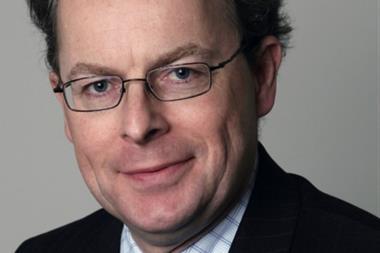The ‘Big Dig’ is how Bostonians refer to the enormous civil engineering project that runs through their city and has sucked in more dollars than the city probably cares to contemplate. The day of its completion appears to be as problematic as ever.
In Franklin Street, not far from this site, State Street is engaged on the project of its life, the acquisition and absorbtion of Deutsche Bank’s global securities services business. If it gets its right, the future looks assured; if the deal goes sour, we could be seeing a repeat of the difficulties that Deutsche seemed to have perpetually after buying the Bankers Trust business.
At the topmost level, the difficulties are not being underestimated. State Street chairman and CEO David Spina, does not flinch about what he calls the “execution risk”. “Doing a carve out of a custody business from a universal bank like Deutsche is like doing an organ transplant, with all the veins and nerves and other connections that have to be handled.” He follows up quickly: “But the potential benefits to us strategically, outweigh by a considerable margin the difficulty of the task.”
“It is a once-only opportunity we had to compete for such a substantial deal that catches in the ‘sweet spot’ so perfectly.” The parts that Deutsche wanted to sell really did fit from a functional and geographical sense, he adds.
When the baton passed from State Street’s former chief Marsh Carter to Spina there was the unfinished business of turning the organisation from a US to a global operation. The bank had been trapped to a degree by its success in the US, as every time it set a target for overseas expansion, the domestic market would put on another spurt and swamp the effort.
Now, the centre of gravity of the business will shift more to Europe as a consequence of the deal. Certainly, the new business flow had been going that way. “It has been our sense for the past two or three years that we had been growing more rapidly in Europe than elsewhere.”
With the $2.2trn (E2.2trn) assets under custody that the Deutsche transactions brings potentially, analysts say $400bn refers to US business, though State Street does not give the split between US and European business, but the result is an extra $1.8trn outside the US, which helps change the complexion of the business.
The $8trn in assets when the deal closes – probably in the next two or three months – will make the bank the biggest custodian globally by a good margin. Spina comments: “I have not got used to the fact that we are the largest. But size does matter. It is important for our scale economies and our processing operations, by having a bigger client base over which to spread our technology investment.”
In Europe the question of size is particularly important in his view. “We have to reaffirm our bona fides on the continent, where we have been working very hard and effectively for the past 10 to 15 years. It will change the way we are received in Europe – that will be the main effect of size.”
Spina regards the acquisition as being good for clients, who increasingly are worrying about whether their securities services provider will be there tomorrow. “This commitment to our business is reinforced by this move – there can be no doubters.” And it does mean a greater range of services being provided across the board. “I expect the service capability of incorporating many of the Deutsche global securities professionals in our team will make us better.”
The short-term has some potential for minor dilution in the first 12 months, but then there could be significant upside for the company and shareholders. “From a stockholder’s point of view, we have tried for the first couple of years to keep expectations relatively low, but I personally have expectations beyond the second year, as there are opportunities to improve the profit margins for the entire company. This is based on bringing on a substantial majority of the Deutsche business and not losing it, achieving the cost savings we can achieve and with even a modest amount of selling additional products and services into this new part of our client base.” There may be a few ‘ifs’ there, he concedes.
At a time when enthusiasm and motivation are hard to engender in any workforce because of the surrounding atmosphere, staff are excited and enthused by the prospects, he claims. “I did not realise the latent enthusiasm for this deal among employees. People are excited.” They will see a strengthening of the franchise of the company. Those that want to will see opportunities for personal growth as well, the closer we get to being an effective global player.”
Spina believes this outcome depends on obtaining some economies of scale and taking the custody clients and selling them other services. “A measureable percentage of our growth has come from this feature. While this will not be as easy with a US client as it has been, this fundamental model will work very well in Europe, when we gain access to a bigger client base.”
In Europe, he reckons State Street will have to invest more aggressively in country-specific service solutions, as that is where Europe is at today. He hopes the “equity culture genie has not disappeared back into the lamp”.
In Asia, the bank is looking closely at the Deutsche client base, where the approach was regional managed out of Singapore, while State Street is more country specific with operations in a range of countries there. “We have not decided whether to rely on Singapore for that base of clients or whether we move it around. We are bullish on developments in the Asian market.”
The bank expects to set up an office in Beijing later this year, though no decision as yet as to how to progress further there. “Now is the time to start putting our toes in the water.” There is an alliance in place with the Industrial and Commercial Bank of China.
But the Deutsche deal dominates all. The main challenge of the integration is the client reassurance factor. The operational aspects of integration are tricky, he acknowledges. “But without wanting to underestimate these, we are well organised and positioned for that.”
The goal he personally finds the most challenging and rewarding is to continue the company’s development from a US to a global operation. “We have a very successful company for employees and stockholders, so why change? The reason is because the world is changing – the investment management business and process are going global, so to be effective in the future we are going to have to be globally more sensitive.”
This means having management structures and processes integrated into a model that works, which is something Spina says he is devoting considerable time to. “I am not sure we are ready for a regional headquarters structure just yet, but we do need to empower people closer to the client. The integration cannot be done well from Boston. We have to move out that axis.”
The biggest immediate question has to be that of keeping the focus on growing the business, while integrating the Deutsche acquisition. “The most important answer to that is we are focused. When we got 15 to 20 people responsible for every part of the business around a table to discuss the deal, we agreed there was no trade-off. It was not a question of either or, it was a question of both. We all committed to doing both.”










